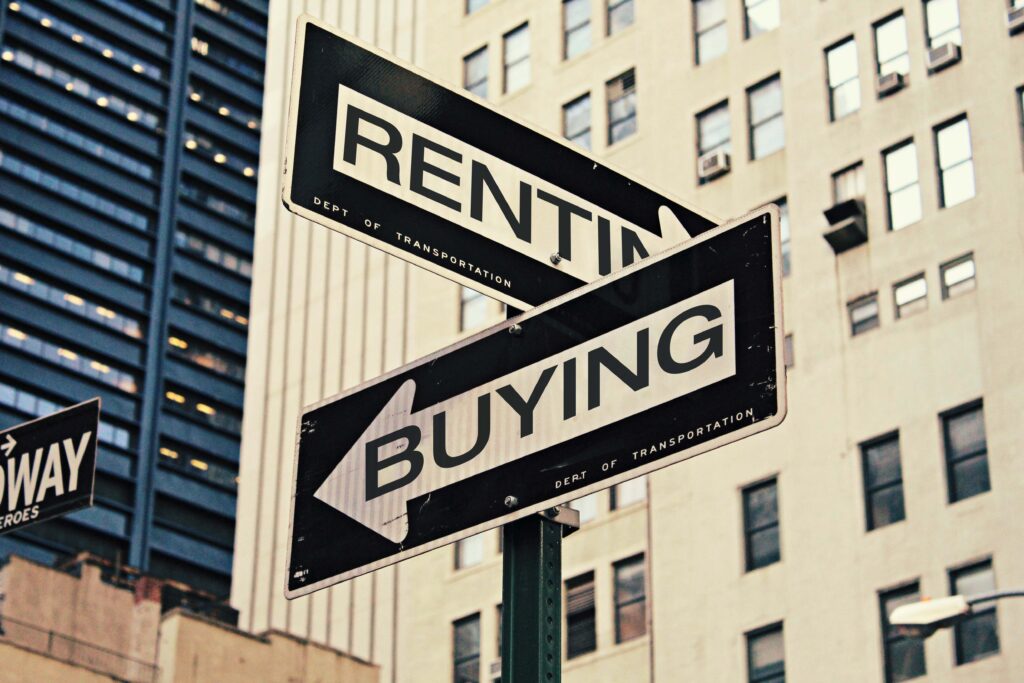With increased mortgage rates, renting has could be more affordable for the first time in over 10 years.
-
The typical monthly rent is now 9.5% or £122 less than a new mortgage repayment for the same rental property
-
Higher mortgage rates have increased mortgage costs faster than rents have been rising
-
It’s still more cost effective to buy in regions with below-average house prices, such as the North of England and Scotland
-
First time buyers in the South of England on average require a 31% or £42,000 deposit match their mortgage repayments to their monthly rent
For the first time in 13 years, paying rent is more affordable than repaying a mortgage if you’re a first-time buyer.
This difference in the cost of renting versus buying is front of mind for many first-time buyers, who account for 1 in 3 home sales.
70% of them are renting in the 3 years before they buy a home, and they’ve historically looked forward to paying less in monthly mortgage repayments than they do in rent.
But with mortgage rates remaining historically high in relation to house prices, this year the cost of repaying a mortgage each month is now more expensive than rent on the same property.
Higher mortgage rates make renting more affordable than mortgage costs
Comparing the average rent to the average monthly mortgage repayment for a first-time buyer. (Under the following conditions; buying the property you rent with a 15% deposit on a 30-year term with a mortgage rate of 5.6%).
If you’re a first-time buyer, your monthly rent could be £122 less than the mortgage repayment on the same home.
Higher mortgage rates have increased a typical first-time buyers’ mortgage repayments by 30% in the last 12 months.
Meanwhile, rents have risen by a lesser 10.4% over the same period, pushing buying to become more expensive than renting.
Mortgage repayments were less than rent for the last 13 years
Since 2010, average mortgage repayments for first-time buyers were £210 cheaper per month than renting on average.
This meant that many better-off first-time buyers could afford to buy a larger 3 bedroom or even 4 bedroom homes, without spending any more on housing each month.
50% of first-time buyers wanted to buy a three bedroom house in 2022.
This was the case up until the mini-budget fall-out last autumn, when the difference between mortgage repayments and rents shrank.
Buying is still more affordable than renting in the North of the UK
Although renting is now more affordable as an average throughout the UK, there are some regions where buying a house still works out better.
There’s a clear north-south divide, as regions with lower property values are cheaper to buy than rent in , by as much as 18% per month.
In the North East of England, a first-time buyer could expect to pay 18% (or £118) less on their mortgage each month than their rent.
And in Scotland, you’d pay 17% (or £128) less on your mortgage than rent.
It’s still marginally cheaper to buy an average-priced rented home than rent in the North West, Northern Ireland, Wales and Yorkshire and the Humber.
However, if mortgage rates increase to 6%, then renting is likely to to shift to be the more affordable option for first time buyers in these regions.
| Region | Average price of a rental home | Deposit (15%) | Average monthly rent | Monthly mortgage repayment | Mortgage repayment vs rent per month |
|---|---|---|---|---|---|
| Scotland | £127,000 | £19,100 | £748 | £620 | -£128 |
| North East | £109,000 | £16,300 | £649 | £531 | -£118 |
| North West | £151,000 | £22,600 | £795 | £736 | -£59 |
| Northern Ireland | £143,000 | £21,500 | £744 | £700 | -£44 |
| Yorkshire and the Humber | £150,000 | £22,500 | £758 | £731 | -£27 |
| Wales | £164,000 | £24,600 | £814 | £799 | -£15 |
| West Midlands | £182,000 | £27,300 | £852 | £890 | £38 |
| East Midlands | £178,000 | £26,700 | £816 | £868 | £52 |
| South West | £243,000 | £36,400 | £1,016 | £1,184 | £168 |
| East of England | £267,000 | £40,000 | £1,111 | £1,301 | £190 |
| South East | £301,000 | £45,200 | £1,254 | £1,469 | £215 |
| London | £522,000 | £78,300 | £2,053 | £2,546 | £493 |
| UK | £263,000 | £39,500 | £1,163 | £1,285 | £122 |
The table shows the cost of mortgage repayments versus monthly rent for first-time buyers using a 15% deposit, 30-year mortgage term and 5.6% mortgage rate.
Why has buying a home in the Midlands become more expensive?
Buying an average-priced rental property in the Midlands became more expensive than renting it when mortgage rates exceeded 5% at the end of 2022.
Plus house prices in the Midlands rose above the national average rate over the last 5 years, which means that first-time buyers need to borrow more to get on the property ladder.
Higher deposits could help first-time buyers in the Midlands align their mortgage repayments with what they’ve been paying in rent.
Research shows that you’d need to add £9,000 to your deposit to make your mortgage repayments closer to your rental payments.
Increase the size of your deposit can make mortgage repayments less than renting in the South of England
It’s a lot easier said than done, but having a bigger deposit when you buy your first home will usually reduce your monthly mortgage repayments.
By increasing your equity, you’ll borrow less from the mortgage provider and you’ll therefore pay less interest.
It may also mean that you’re offered a better interest rate as you have a smaller loan-to-value (LTV) ratio.
If you can add £5,000 to your deposit, on average you reduce your LTV by 2%. This brings your monthly mortgage repayment down by 2.2%.
The benefit of a bigger deposit will be greater in the regions where buying has recently become more expensive than renting, like in the Midlands.
However, you’ll need to add much more to your deposit in the South of England to keep your monthly mortgage repayments in line with your rent.
Renting is at least £160 less than paying a mortgage each month in all southern regions. That gap reaches £490 in London.
To match mortgage payments to the average rent in London, you’d need to increase your deposit to 31% of the property value – equivalent to £164,000.
In other southern regions, a 31% deposit to match your mortgage payment to your rent ranges from £66,000 in the South West to £83,000 in the South East.
What help to buy options are there and how to save in a cost of living crisis?
Falling mortgage rates might ease pressure on first-time buyers searching for extra equity. Mortgage rates falling back to 5% mean mortgage payments would end up matching average rent with a 23% deposit in southern regions.
Other options to reduce monthly repayments.
Buy a home together
Buying yoour first home with another person, such as a partner, family member or friend can reduce your mortgage costs.
With both of your savings added together, you’ll increase your deposit and reduce your LTV. This may give you access to better mortgage rates, and you’ll pay less interest overall.
Of course, you need to think about whether it’s right for you to buy a house together.
Consider changing your home requirements
It can be really difficult to find extra money for a deposit. If you’re struggling, you could reconsider what you need from your first home.
Maybe you could go for a smaller property, or a terraced home or flat instead of a semi- or detached house. Searching further afield and outside of cities may also surface more affordable properties.


